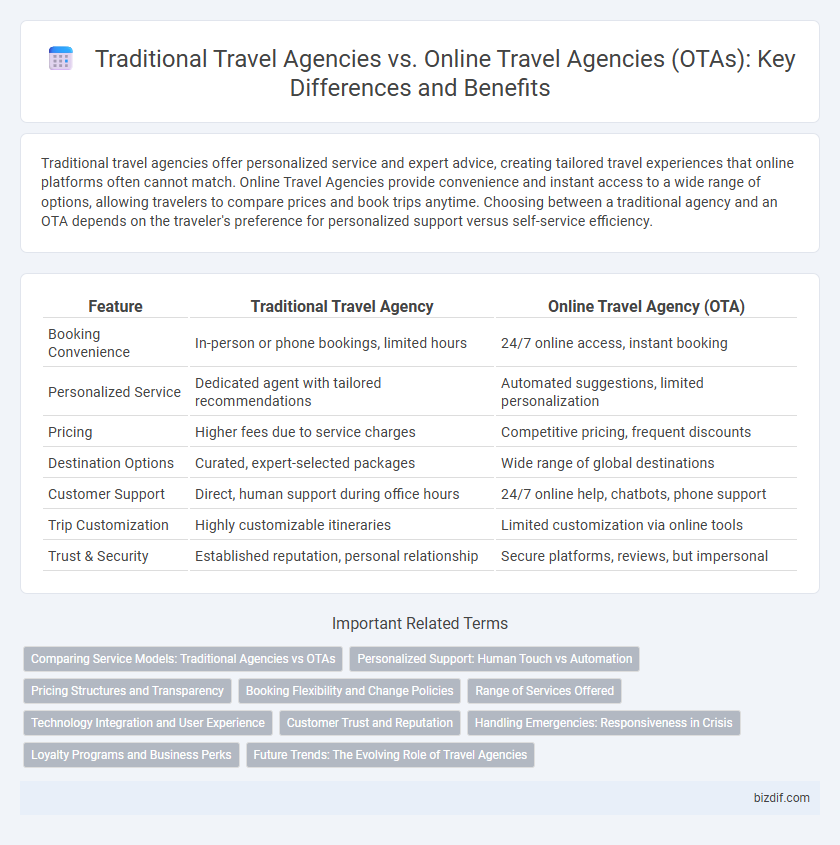Traditional travel agencies offer personalized service and expert advice, creating tailored travel experiences that online platforms often cannot match. Online Travel Agencies provide convenience and instant access to a wide range of options, allowing travelers to compare prices and book trips anytime. Choosing between a traditional agency and an OTA depends on the traveler's preference for personalized support versus self-service efficiency.
Table of Comparison
| Feature | Traditional Travel Agency | Online Travel Agency (OTA) |
|---|---|---|
| Booking Convenience | In-person or phone bookings, limited hours | 24/7 online access, instant booking |
| Personalized Service | Dedicated agent with tailored recommendations | Automated suggestions, limited personalization |
| Pricing | Higher fees due to service charges | Competitive pricing, frequent discounts |
| Destination Options | Curated, expert-selected packages | Wide range of global destinations |
| Customer Support | Direct, human support during office hours | 24/7 online help, chatbots, phone support |
| Trip Customization | Highly customizable itineraries | Limited customization via online tools |
| Trust & Security | Established reputation, personal relationship | Secure platforms, reviews, but impersonal |
Comparing Service Models: Traditional Agencies vs OTAs
Traditional travel agencies provide personalized, face-to-face consultation and customized travel planning, often offering in-depth local knowledge and tailored services. OTAs utilize digital platforms to deliver instant booking options, competitive pricing, and extensive user reviews, catering to tech-savvy travelers seeking convenience and speed. While traditional agencies emphasize service quality and expert advice, OTAs prioritize accessibility and wide product selection through automated, self-service models.
Personalized Support: Human Touch vs Automation
Traditional travel agencies offer personalized support through direct human interaction, providing customized travel advice and real-time problem-solving that caters to individual preferences and special requests. In contrast, Online Travel Agencies (OTAs) rely primarily on automated systems and algorithms to deliver recommendations and booking services, often lacking the nuanced understanding and empathy that human agents provide. The human touch in traditional agencies enhances customer trust and satisfaction, especially for complex itineraries or last-minute changes.
Pricing Structures and Transparency
Traditional travel agencies often charge service fees and offer bundled packages, resulting in less price transparency compared to Online Travel Agencies (OTAs). OTAs provide real-time pricing with dynamic updates, allowing customers to compare multiple options and access exclusive online discounts. Transparent fee disclosures and user reviews on OTA platforms enhance informed decision-making and competitive pricing transparency.
Booking Flexibility and Change Policies
Traditional travel agencies often provide personalized booking flexibility with tailored change policies, allowing clients to negotiate modifications directly with agents. Online Travel Agencies (OTAs) typically offer standardized change policies that may include fees or restrictions, limiting flexibility but providing instant online modifications. Understanding these differences helps travelers choose the best option based on their need for customized service versus convenience and speed.
Range of Services Offered
Traditional travel agencies provide personalized, face-to-face customer service with tailored travel packages and exclusive local insights, often focusing on niche markets or luxury experiences. Online Travel Agencies (OTAs) offer a vast range of services through digital platforms, including real-time booking, price comparison, and instant access to flights, hotels, and rental cars worldwide. OTAs excel in convenience and extensive inventory, while traditional agencies deliver customized planning and expert guidance for complex itineraries.
Technology Integration and User Experience
Traditional travel agencies often rely on in-person consultations and manual booking processes, limiting their technology integration compared to Online Travel Agencies (OTAs). OTAs utilize advanced algorithms, real-time data processing, and mobile app interfaces to offer seamless booking experiences, personalized recommendations, and instant updates. Enhanced user experience through AI-driven search functionalities and integrated payment systems positions OTAs as more efficient and accessible options for tech-savvy travelers.
Customer Trust and Reputation
Traditional travel agencies often benefit from established customer trust and personalized service, which enhances their reputation through face-to-face interactions and long-term relationships. Online Travel Agencies (OTAs) leverage extensive user reviews, transparent pricing, and instant booking convenience to build trust rapidly, appealing to tech-savvy travelers seeking efficiency. Reputation management for OTAs relies heavily on digital customer feedback and real-time support, whereas traditional agencies depend on consistent service quality and local market knowledge to maintain credibility.
Handling Emergencies: Responsiveness in Crisis
Traditional travel agencies offer personalized, real-time support during emergencies, providing direct access to knowledgeable agents who can swiftly adjust itineraries and offer tailored solutions. OTAs rely heavily on automated systems and customer service centers, which may result in slower response times and limited flexibility when addressing urgent travel disruptions. The hands-on approach of traditional agencies often ensures more effective crisis management and traveler reassurance compared to the standardized protocols of OTAs.
Loyalty Programs and Business Perks
Traditional travel agencies often offer personalized loyalty programs with exclusive rewards tailored to frequent travelers, fostering long-term customer relationships. Online Travel Agencies (OTAs) provide a broader range of business perks such as instant booking discounts, flexible payment options, and access to extensive hotel and flight inventories. Corporate clients benefit from OTAs' dynamic pricing models and integrated expense management tools, enhancing travel budget control and efficiency.
Future Trends: The Evolving Role of Travel Agencies
Traditional travel agencies are integrating advanced technologies like AI-driven personalization and virtual reality experiences to enhance customer engagement and service efficiency. Online Travel Agencies (OTAs) are expanding beyond booking platforms to offer integrated travel ecosystems, including AI-powered recommendations and seamless multi-channel support. The future trend emphasizes a hybrid model where both traditional agencies and OTAs leverage digital innovation to provide personalized, immersive, and convenient travel solutions.
Traditional agency vs OTA (Online Travel Agency) Infographic

 bizdif.com
bizdif.com